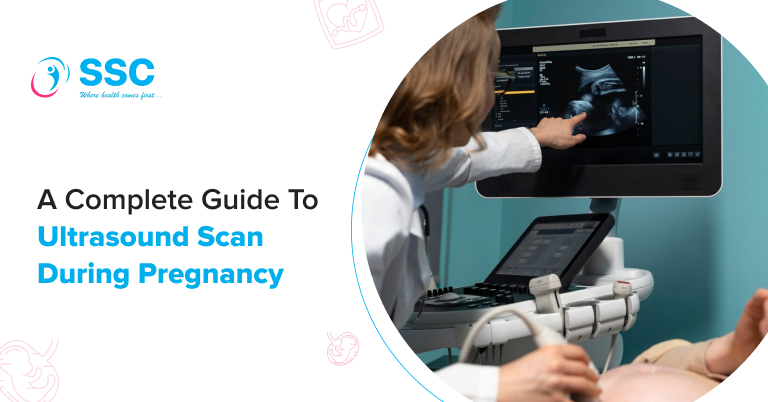Women find pregnancy to be an exciting time, although there may be times when they are uncertain. Getting regular ultrasounds to track the health and growth of the developing baby is an essential part of prenatal treatment.
We’ll answer common queries regarding prenatal ultrasounds in this blog, including when they’re advised, their importance, if getting one every two weeks is safe, and its benefits.
What is an Ultrasound?
An ultrasound, sometimes referred to as a sonogram, is a typical prenatal test that most expectant mothers get. It generates a picture of the fetus inside the uterus using sound waves. This test enables healthcare professionals to track the health and growth of the unborn child during pregnancy.
Prenatal ultrasounds are safe; however, they should only be carried out when absolutely required by a doctor. The frequency and timing of ultrasounds may change for women who have specific medical issues, such as obesity or asthma. Neither radiation nor needles are used during this noninvasive treatment.
Why is Ultrasound Important during Pregnancy?
An ultrasound is a quick, easy test that can provide you and your doctor with vital information about your pregnancy and fetus. An ultrasound during pregnancy may be used by your doctor to:
- Confirmation of pregnancy: Helps in confirming your pregnancy.
- Estimating Due Date: This method determines your due date by evaluating the baby’s age and growth.
- Monitoring Development: Examines the infant’s general development, mobility, muscle tone, and heartbeat.
- Multiple Detection: Find out if you are carrying twins, triplets, or more.
- Position Check: Verifies that the infant is in the head-first position prior to birth.
- Reproductive Organ Examination: Assesses the condition of your uterus and ovaries.
- Identifying Pregnancy Complications: Identifies possible miscarriage symptoms or conditions like molar pregnancy or ectopic pregnancy.
- Cervical and Placental Assessment: Assesses the placenta’s location and the cervix’s length.
- In-Depth Organ and Growth Check: Carefully consider the baby’s size, growth rate, and organs.
How Many Ultrasounds Will You Get During Pregnancy?
The majority of pregnant women usually undergo three to four ultrasounds during their pregnancy. However, depending on your current medical conditions and the approach used by your healthcare professional, the exact amount and timing may change.
Further ultrasounds could be suggested for closer monitoring in high-risk pregnancies or if there are uncertainties regarding the mother’s or the unborn child’s health.
When will you have an Ultrasound Scan?
Early Pregnancy/ Dating Scan:
Usually performed between weeks 8 and 11, this scan helps confirm your pregnancy and estimate your due date (EDD) while also detecting your baby’s heartbeat. It provides reassurance and is crucial prior to the non-invasive prenatal test (NIPT), which determines the likelihood of Down syndrome. The scan is typically done on your stomach.
Nuchal Translucency scan:
Usually, this scan is performed between 11 and 14 weeks. Usually, this scan is done abdominally.
- Heartbeat Confirmation: Examines the baby’s heartbeat.
- Determine Pregnancy Length: Assists in determining the length of pregnancy.
- Measure Baby’s Length: This method determines the baby’s length in order to monitor growth.
- Detect Multiple pregnancies: Determines if more than one child is present and evaluates placenta sharing.
- Baby’s Structure: Examine the baby’s structure, taking measurements of the fluid behind the neck.
- Chromosomal Issue Screening: Examines the possibility of Patau, Edward, and Down syndromes.
Fetal anomaly scan:
This scan, which is often done between weeks 19 and 22, provides a thorough evaluation of your baby’s growth from head to toe to make sure everything seems normal for this point. It’s during this scan that most abnormalities are detected. Additionally, the risk of preterm labor can be predicted by an inside scan that measures the length of your cervix.
Growth Scan:
These scans are used to track the baby’s development and health after 24 weeks. The baby’s weight is estimated by taking precise measurements of the head, abdomen, and thighs.
In addition to measuring blood flow through the umbilical cord and the baby’s blood vessels, the volume of amniotic fluid around the infant is also calculated (Baby Doppler scans).
Although 36 weeks is usually the suggested time for these scans, depending on certain circumstances, they may be performed more frequently, such as every four weeks.
Can an Ultrasound Scan be Performed Every Two Weeks?
Generally speaking, pregnancy scans are safe and help in tracking your health and the health of your unborn child. It is not advised to have a scan every two weeks, though, as this could cause unnecessary stress and anxiety.
Regular prenatal checkups are usually sufficient, though your doctor may recommend more frequent scans if you have a medical issue or a high-risk pregnancy.
Can an Ultrasound Scan Affect Your Baby?
Generally speaking, ultrasounds are entirely safe for you and your child. They are safer than X-rays because they employ sound waves rather than radiation. Healthcare professionals have been using ultrasounds for more than 30 years, and no adverse risks have been found.
Benefits of Ultrasound Scans During Pregnancy:
- Through ultrasound, doctors can monitor your unborn child’s development, guaranteeing healthy growth throughout your pregnancy.
- It examines the baby’s organs and tissues to help identify possible abnormalities and provide comprehensive information on the fetus’s health.
- Early intervention is made possible by the ability of early ultrasound scans to detect high-risk pregnancies, such as multiple pregnancies or placental problems.
- Ultrasound verifies a viable pregnancy by identifying the baby’s heartbeat, gestational age, and position of the embryo or fetus.
- When symptoms like vaginal bleeding are present, it offers confidence by ruling out issues like miscarriage or ectopic pregnancy.
- By enabling parents to see their unborn child, ultrasound promotes emotional attachment and improves the pregnancy experience.
The Bottom Line:
Pregnancy ultrasounds can be both exciting and challenging. They help a doctor better understand how your kid is growing and developing. Get to know your baby’s growth and development with the best gynecology hospital in Bangalore. Contact us today to schedule an ultrasound scan during pregnancy.




















